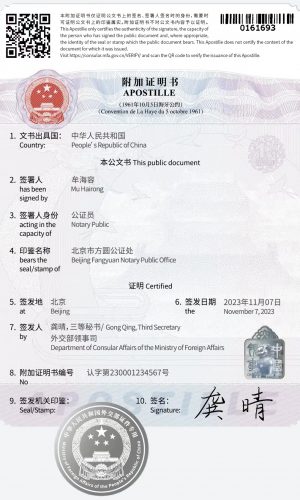Starting from November 7, 2023, the “Convention Abolishing the Requirement of Legalization for Foreign Public Documents” will come into effect and be implemented in China.
A more efficient, convenient, and cost-effective Hague apostille is here!
The implementation of the “Convention” means that China will directly eliminate the consular authentication process between member countries. Chinese public documents only need to obtain the apostille (Apostille) specified by the “Convention” for use in other contracting states. Similarly, public documents from other contracting states for use in mainland China only need to obtain the apostille of that country.
Hague authentication (also known as Apostille authentication) is an international certification method provided by the 1961 Hague Convention. It is used to authenticate documents used abroad. Its purpose is to prove the authenticity of the document, allowing it to have legal validity abroad. Hague authentication does not certify the content of the authenticated document but only certifies the authenticity of the first issuer of the authentication, proving its authenticity and the right to authenticate.
After the Hague Convention comes into effect, if you want to use domestic documents abroad, you only need to notarize and translate the documents first, and then go to the authorized department for Hague authentication. The document can then be used in the destination country.
- Business Authentication Documents: Business license, company/individual power of attorney, company/individual authorization letter, company/individual patent certificate, certificate of origin, inspection and quarantine certificate, business proof inspection certificate, employment certificate, unit dispatch letter, business contract, agency contract, packing list, company price list, company/individual invoice, customs declaration, company renaming, export registration form, etc.
- Civil Authentication Documents: Birth medical certificate, proof of kinship, marriage certificate, divorce certificate, custody judgment, inheritance judgment, property certificate, vehicle certificate, intellectual property certificate, and other civil proof documents.
- Other Categories of Documents: In addition to the above two categories, some other documents can also be authenticated. For example, school graduation certificates and degree certificates, passports and identity certificates, labor employment contracts and labor contracts, health examination reports and disease diagnosis certificates issued by medical institutions, notarized wills, and powers of attorney, etc.
The sample of the apostille certificate issued by China is as follows

Which countries are specific parties to the Convention?
Asia (22): China, Armenia, Azerbaijan, Bahrain, Brunei, Georgia, India, Indonesia, Israel, Japan, Kazakhstan, Kyrgyzstan, Mongolia, Oman, Pakistan, the Philippines, South Korea, Saudi Arabia, Singapore, Tajikistan, Turkey, Uzbekistan.
Africa (16): Botswana, Burundi, Cape Verde, Eswatini, Lesotho, Liberia, Malawi, Mauritius, Morocco, Namibia, Rwanda, Sao Tome and Principe, Senegal, Seychelles, South Africa, Tunisia.
Europe (44): Albania, Andorra, Austria, Belarus, Belgium, Bosnia and Herzegovina, Bulgaria, Croatia, Cyprus, Czech Republic, Denmark, Estonia, Finland, France, Germany, Greece, Hungary, Iceland, Ireland, Italy, Latvia, Liechtenstein, Lithuania, Luxembourg, Malta, Monaco, Montenegro, Netherlands, North Macedonia, Norway, Poland, Portugal, Moldova, Romania, Russia, San Marino, Serbia, Slovakia, Slovenia, Spain, Sweden, Switzerland, Ukraine, United Kingdom.
North America (21): Antigua and Barbuda, Bahamas, Barbados, Belize, Canada, Costa Rica, Dominica, Dominican Republic, El Salvador, Grenada, Guatemala, Honduras, Jamaica, Mexico, Nicaragua, Panama, Saint Kitts and Nevis, Saint Lucia, Saint Vincent and the Grenadines, Trinidad and Tobago, United States.
South America (12): Argentina, Bolivia, Brazil, Chile, Colombia, Ecuador, Guyana, Paraguay, Peru, Suriname, Uruguay, Venezuela.
Oceania (10): Australia, Cook Islands, Fiji, Marshall Islands, New Zealand, Niue, Palau, Samoa, Tonga, Vanuatu. On January 11, 2024, the Convention will come into effect for Canada, and the Convention will apply between China and Canada from that day.
Note:
- On June 5, 2024, the Convention will come into effect for Rwanda, and the Convention will apply between China and Rwanda from that day.
- The Convention does not apply between China and countries that do not recognize the sovereign status of the Convention members.
- The Convention does not apply between China and India.
Must foreign notarized certificates be accompanied by an apostille certificate?
In general, foreign notarized certificates issued domestically and sent to Convention member countries should be accompanied by an apostille certificate if required by the relevant country’s document agency.
How to handle the apostille certificate for domestic documents sent abroad for use?
If a notarized foreign document or other proof document issued in mainland China needs to be apostilled for use in Convention member countries, it should be applied to the Consular Affairs Department of the Ministry of Foreign Affairs, or the local foreign affairs office entrusted by the Ministry of Foreign Affairs.
How to verify the authenticity of the apostille certificate?
According to the “Convention,” the competent authority of the contracting state should establish a register for the apostille certificates it issues and, upon application by any interested party, verify the authenticity of the apostille certificate. To verify the authenticity of the apostille certificate issued by China, you can visit the Consular Services website of China (http://cs.mfa.gov.cn/) under the “Document Verification” section, use the “Consular Authentication/Apostille Certificate Verification” system, enter the authentication number and sticker number for verification, or access the verification website (https://consular.mfa.gov.cn/VERIFY/) indicated on the apostille certificate and scan the QR code for verification. To verify the authenticity of the apostille certificate issued by the contracting state, you can contact its competent authority. Specific names and contact information can be found on the official website of the Hague Conference on Private International Law.
How to know whether to apply for an apostille certificate or a consular authentication certificate?
In general, documents issued domestically in China and sent to Convention member countries should apply for an apostille certificate according to relevant regulations. If sent to non-contracting countries of the Convention, consular authentication certificates should be applied for according to relevant regulations.
Can an apostille certificate for multiple copies of documents be applied for?
Yes. Parties can apply for the corresponding number of notarized foreign documents or other proof documents (all originals) according to the requirements of the country using the documents and apply for apostille certificates according to relevant regulations.